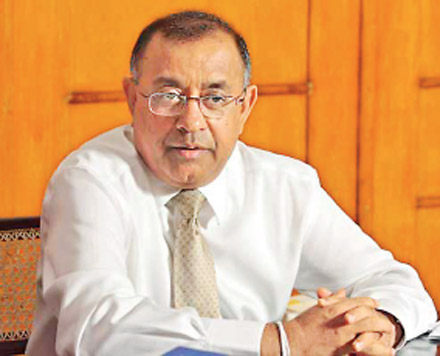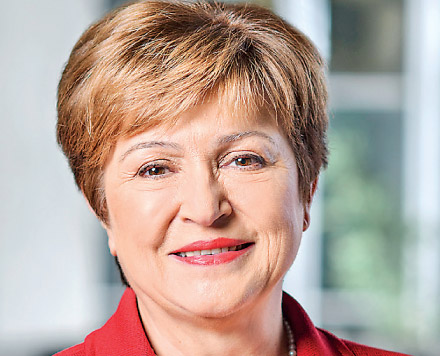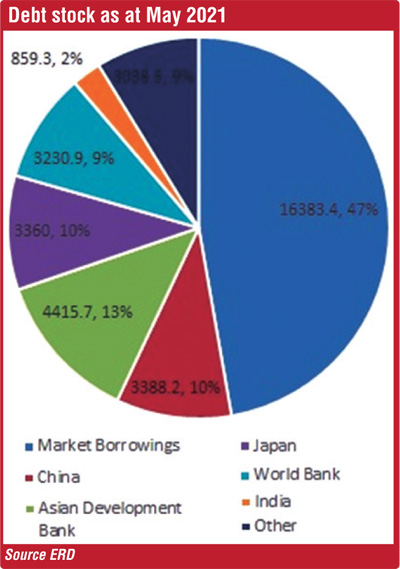Tuesday Feb 17, 2026
Tuesday Feb 17, 2026
Friday, 6 August 2021 00:15 - - {{hitsCtrl.values.hits}}

Secretary to the President Dr. P.B. Jayasundera

IMF Managing Director Kristalina Georgieva
 According to Reuters, the IMF recently approved a bailout worth nearly $ 449 million for OPEC member Congo Republic, giving a clear message to other nations struggling under the weight of large commercial debts and reeling from the impact of the pandemic to come to them for forex relief.
According to Reuters, the IMF recently approved a bailout worth nearly $ 449 million for OPEC member Congo Republic, giving a clear message to other nations struggling under the weight of large commercial debts and reeling from the impact of the pandemic to come to them for forex relief.
Congo’s economy is worth around $ 50 billion in GDP terms and its debt levels have ballooned to 120% of GDP by 2020. This is despite having oil and being part of the OPEC.
China or the US cannot, or don’t have the appetite to, bail out developing economies like Congo, as they are not in the business of financing and reconstruction of economies, unlike the IMF, or ADB or WB. If they could, they would do so, for political and economic reasons. Both countries want to support success stories with their investments to tell their citizens about their global achievements. On the other hand countries like Sri Lanka would not have gone to India or China to borrow money and to Bangladesh for forex relief if the pandemic did not hit the tourism industry so hard.
Unlike Congo, in the case of Sri Lanka, Secretary to the President Dr. P.B. Jayasundera says: “Sri Lanka has no immediate plan to seek financing from the International Monetary Fund (IMF)”. He succinctly pointed out in a recent interview published in a local newspaper that ‘going to the IMF would not bring tourism or exports back’. He certainly has a point, but tourism will take two more years to recover and exports will take more time to scale up. If this is his opinion that must be now the Government’s official position.
This is not the time to tell the IMF to go to hell. Due to the pandemic all citizens, businesses, farmers suffer hugely and this makes the economy and the lives of the poor vulnerable. The IMF’s mandate, ratified by Sri Lanka as a member, is to create financial stability and be the lender of
last resort.
According to EconomyNext, Sri Lanka could get up to $ 800 million from the International Monetary Fund as a part of a new allocation of Special Drawing Rights, a reserve asset created by the IMF in 1969 to supplement the official reserves of its member countries.
 New opportunity
New opportunity
On 2 August, the IMF Board according to IMF news approved a general allocation of Special Drawing Rights (SDRs) equivalent to $ 650 billion about SDR 456 billion, to boost global liquidity.
IMF Managing Director Kristalina Georgieva said: “This is the largest SDR allocation in the history of the IMF and a shot in the arm for the global economy at a time of unprecedented crisis. The SDR allocation will benefit all members, address the long-term global need for reserves, build confidence, and foster the resilience and stability of the global economy. It will particularly help our most vulnerable member countries struggling to cope with the impact of the COVID-19 crisis.”
According to the IMF, the general allocation of SDRs will become effective on 23 August and the newly-created SDRs will be credited to IMF member countries in proportion to their existing quotas in the Fund.
Further, according to the IMF, about $ 275 billion (about SDR 193 billion) of the new allocation will go to emerging markets and developing countries, including low-income countries.
Georgieva went a step further when she said: “We will also continue to engage actively with our membership to identify viable options for voluntary channeling of SDRs from wealthier to poorer and more vulnerable member countries to support their pandemic recovery and achieve resilient and sustainable growth.”
Concerns
Whilst there are genuine concerns about going to the IMF on the basis that the IMF imposes stringent conditions, will push hard for structural reforms and will move clinically to fix the exchange rate resulting in an increase in the cost of living, however, unlike before, the agency is under immense pressure to help vulnerable countries in their economic recovery efforts. Therefore seeking IMF support during this pandemic will be much more favorable for the Government than before.
We may need their support given that many international investors have moved out of developing countries and tourism has virtually disappeared and will only return only when the pandemic is contained and the majority of the population is vaccinated. This has given rise to exchange rate vulnerability, BOP challenges and debt servicing pressures for developing countries.
Many of these countries were financially viable and growing over 4% prior to the pandemic, but unfortunately now facing unsustainable debt payments due to huge commercial borrowings. The rating agencies who liberally issue opinions have also joined the bandwagon to make life difficult for many of these countries. Ironically, in the pandemic their opinions have influenced the credit flows in a big way.
For the IMF it is a remaking of history once again in the aftermath of a pandemic. The IMF was established in 1944 in the aftermath of the Great Depression of the 1930s to support countries to recover and to create financial stability globally. Therefore Georgieva has said publicly: “We will continue to engage actively with our membership to identify viable options for voluntary channeling of SDRs from wealthier to poorer and more vulnerable member countries to support their pandemic recovery and achieve resilient and sustainable growth,”
This is Sri Lanka’s opportunity to get concessional support and we should not miss the bus for ideological reasons. The country is far more important.